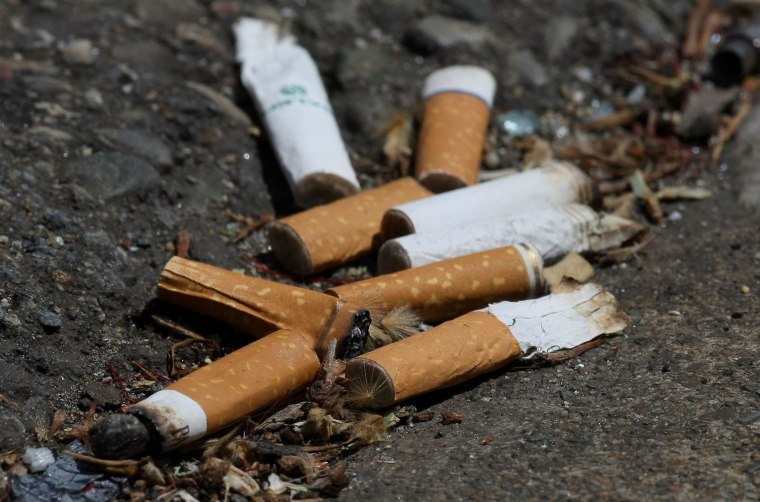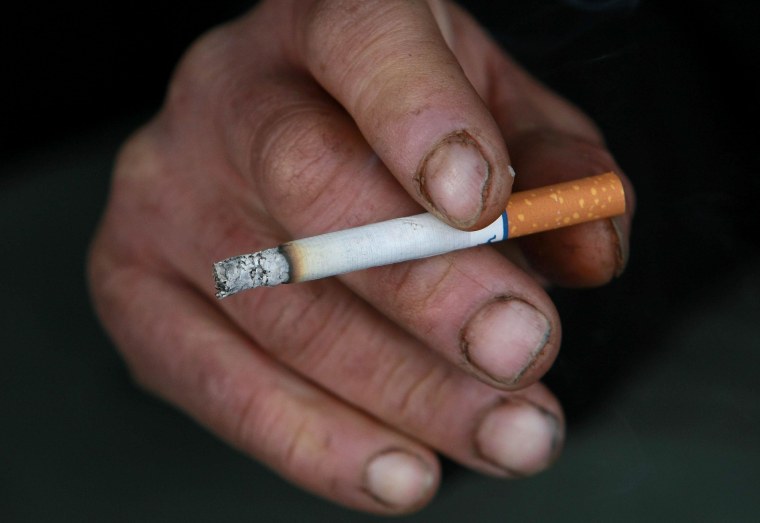LIMA, Peru — A protracted legal battle in an obscure World Bank tribunal over the principles of market competition in a South American backwater. Even by trade dispute standards, this one sounds arcane — the perfect cure for insomnia perhaps.
But before you nod off, here’s a triple shot of espresso:
Uruguay’s fight with Philip Morris, the world’s largest cigarette manufacturer, just might mark a turning point in the global smoking pandemic that the World Health Organization (WHO) expects to cost up to 1 billion lives this century.
Four out of five of those deaths will happen in developing nations, acting like a ball and chain on those countries' attempts to grow economically and lift hundreds of millions out of desperate poverty.
Philip Morris, whose brands include Marlboro, is objecting to a 2009 Uruguayan law that requires cigarette packs to be 80 percent covered by health warnings, including graphic photos of cancer victims.

The company claims the law violates Uruguay’s 1988 bilateral investment treaty with Switzerland, where Philip Morris International is headquartered, and is demanding $25 millionin compensation for damage to its brands.
The cigarette maker insists it actually supports most anti-smoking measures worldwide. And citing academic studies — some of which the company funded itself — it claims health warnings on packs don’t even reduce smoking.
“We take issue with regulation that strips a legal industry of its property, denies access to basic due process, or lacks a scientific basis,” said Julie Soderlund, Philip Morris International’s vice president of communications.
Anti-smoking campaigners don’t buy that. “If plain packaging doesn’t lower consumption then why do they care?” asks Chris Bostic, of US anti-tobacco group Action on Smoking and Health (ASH).Uruguay’s fight with Philip Morris, the world’s largest cigarette manufacturer, just might mark a turning point in the global smoking pandemic
Eduardo Bianco, a cardiologist who heads Uruguay’sTobacco Epidemic Research Center (CIET), adds: “The strategy is to beat up a small, undeveloped nation that dared to confront the power of the tobacco industry, and thus intimidate other countries, especially undeveloped ones.”
“If Uruguay wins, it will open up a Pandora’s box for the tobacco industry and many other countries could follow Uruguay’s lead. Philip Morris knows that.”
Bostic agrees, saying the company wants to establish a “legal chill” on anti-smoking measures around the world.
“Uruguay is a bellwether,” he told GlobalPost. “There have been many of these lawsuits, but against richer nations such as Australia and Norway. This is the first targeting a country with limited resources.”
The case, being heard in Paris before the World Bank’s International Center for Settlement of Investment Disputes, is expected to cost Uruguay up to $8 million in legal fees — more than most poor nations’ annual budgets for anti-smoking measures.
The odds appear to favor Philip Morris, whose 2013 sales of $80 billion dwarf Uruguay’s $56-billion GDP.
And the stakes could hardly be higher. Although cigarette consumption has fallen in the United States and most other rich countries thanks to anti-smoking laws — not to mention cancer and other deadly diseases — globally, it’s booming.
Although cigarette consumption has dropped in the U.S., globally it's booming.
The proportion of smokers may have shrunk thanks to rising population, but the actual number of smokers jumped from 721 million in 1980 to 967 million in 2012, according to this study.
That’s the result of an aggressive marketing campaign by the tobacco industry, which has seen its sales also rise to roughly $700 billion a year.
The increase in smokers has triggered a world pandemic that, unchecked, will kill up to 10 times more people this century than the 100 million who died from tobacco during the 20th century, according to the WHO.
The cigarette crisis is also undermining global attempts to defeat poverty, says Doug Webb, a public health expert at the United Nations Development Program.
Overall, his agency has calculated that smoking costs between 1 percent and 2 percent of global GDP. That burden is placed disproportionately on the poorest countries, where most smokers now reside.
In some cases, families without enough cash to cover food and health care are spending up to 15 percent (page XIII) of their income on tobacco, Webb notes.
Uruguay’s fight with Philip Morris, the world’s largest cigarette manufacturer, just might mark a turning point in the global smoking pandemic
That leaves hungry and sick children unable to concentrate at school, if they even attend, locking them into a poverty cycle that passes from one generation to the next.
"Impoverishment is a direct result of consuming tobacco," Webb told GlobalPost. “It is the poorest who are most likely to smoke in any country, whether you are talking about Uruguay, Egypt or Indonesia. They are the ones who are least able to afford tobacco, never mind the health care costs that inevitably follow."
"The narrative has been that smoking is simply a matter of personal choice, and that if you smoke it is your own fault. We now realize this is not true, that the decision to smoke is instead largely shaped by the social environment."
That environment, Webb says, includes the advertising that is everywhere in modern life, as well as the glamorous branding of cigarette packaging.
Uruguay’s willingness to take on this battle fits with its reputation as one of the world’s most progressive nations, allowing abortion on demand and gay marriage, and legalizing marijuana.
Both kinds of weed, tobacco and marijuana, were on the agenda when Uruguayan PresidentJose Mujica met Barack Obama at the White House in May.
But the reasons for tamping down smoking have little to do with lefty politics. Uruguay has Latin America’s highest proportion of smokers, according to Bianco. Lung cancer is the leading killer of men there, and, on current trends, it will soon be the leading killer of women.
Few would have been more aware of the problem than Tabare Vazquez, Uruguay’s president at the time the 2009 law was passed. He is a practicing oncologist.
But Uruguay, whose legal costs are being partly met by former New York Mayor Michael Bloomberg’s foundation, is hardly the only nation cracking down on smoking — or facing the wrath of the tobacco industry.
In 2012, Australia implemented a similar law — and was promptly sued at the World Trade Organization by tobacco-growing nations including Cuba, Honduras and the Dominican Republic, whose legal fees are being paid for by cigarette companies. Japan Tobacco Inc. is also now suing Thailand over a similar piece of legislation.
Meanwhile, the European Union recently approved its Tobacco Products Directive requiring health warnings on 50 percent of the fronts of packs. That was despite lobbying from US senators from tobacco states, including Rand Paul (R-KY) and Kay Hagan (D-NC).
But Mujica, for one, does not appear ready to back down.
As he told Obama about the toll of big tobacco: “It’s murder. We are in an arduous fight, very arduous, and we must fight against very strong interests. … Nobody must be distracted in this fight for life, because out of all values, the most important one is life itself.”
A ruling in Uruguay v. Philip Morris is expected in 2015.
This story was originally published on GlobalPost.
More stories from GlobalPost:
These are the women helping child migrants as they make their way to the U.S.
Pope orders envoys to visit Paraguay's problem priest's diocese
